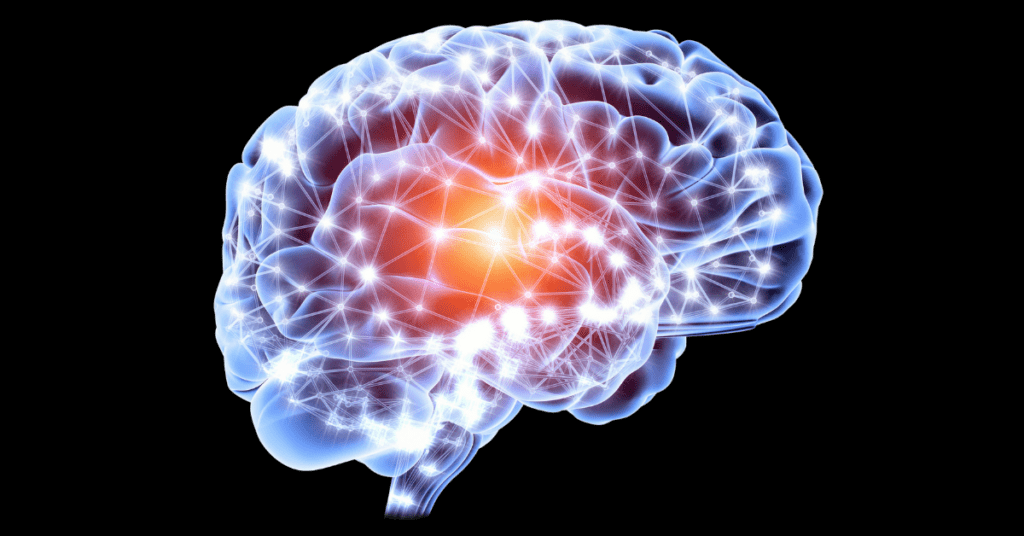If you’re like the vast majority of people with tinnitus, that persistent ringing in the ears is “all in your head.” That doesn’t mean you’re imagining it – hearing that phantom sound is very real and can have a significant impact on your life.
Regardless of the source, the brain is responsible for the way you perceive and understand sound. This process is fascinatingly complex, and gaining a deeper understanding of the way the brain creates tinnitus may be the key to reducing the volume.
What Is Tinnitus?
Tinnitus is the perception of sound when there is no external noise. There are two types of tinnitus: subjective and objective.
Subjective tinnitus can only be heard by the individual experiencing it. Most people describe it as a ringing in the ears, but others say it’s more like a buzzing, clicking, or whooshing sound. Subjective tinnitus is the most common type by far, and is usually a symptom of hearing loss or another change in hearing.
Objective tinnitus can be heard by others. This rare form of tinnitus is typically caused by an underlying medical condition like cardiovascular problems, resulting in pulsatile tinnitus. In this case, the whooshing, roaring, or clicking sound is usually synchronized to the heartbeat.
"Treble Health helped me reduce my tinnitus by about 80%, and now I can live my life again!"


"Treble Health helped me reduce my tinnitus by about 80%, and now I can live my life again!"
– Steve D.
Book a free consultation to learn which Treble Health solution is right for you. Join Steve and thousands more who have found lasting tinnitus relief.
Many people experience intermittent tinnitus, and these experiences tend to be brief, mild, and resolve on their own. But for as many as 20% of the general adult population, persistent, chronic tinnitus can be intrusive and distressing. Subjective tinnitus may be invisible, but it can become so severe that symptoms lead to anxiety, depression, trouble sleeping, or even other communication disorders.
What Causes Tinnitus?
Tinnitus is a symptom, not a disease. However, it may be related to underlying conditions like blood pressure issues, infections, or illnesses, so it’s a good idea to speak with your doctor if you experience ongoing tinnitus.
Most often, tinnitus is related to hearing loss. In fact, as many as 90% of people with tinnitus also have hearing loss. Hearing loss-related tinnitus can have many root causes:
- Age-related hearing changes (presbycusis)
- Noise-induced hearing loss
- Sudden sensorineural hearing loss
- Conductive hearing loss
Tinnitus causes are not limited to hearing changes, either. Other causes of chronic tinnitus can include:



- Ear infections (otitis media or otitis externa)
- Inner ear disorders like Meniere’s disease
- Ototoxic (ear-damaging) medications
- Blockages from earwax or foreign objects
- Sinus infections, allergies, or the common cold
- Temporomandibular joint disorders (TMJ)
- Blood pressure or cardiovascular issues
- Otosclerosis
- Autoimmune disorders
- Head injuries
- Chronic pain
- …and many more.
In some cases, bothersome tinnitus has no clear-cut cause that can be treated. Fortunately, there are tinnitus management options that can lessen the frustrating phantom sounds and help you find relief.
Tinnitus And The Brain
To understand how tinnitus can have so many causes and have such an impact on health, we must first understand how the brain interprets sound.
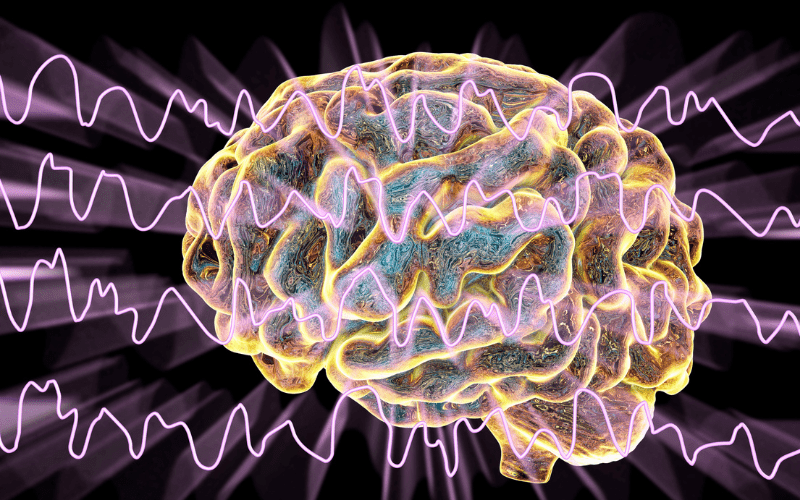

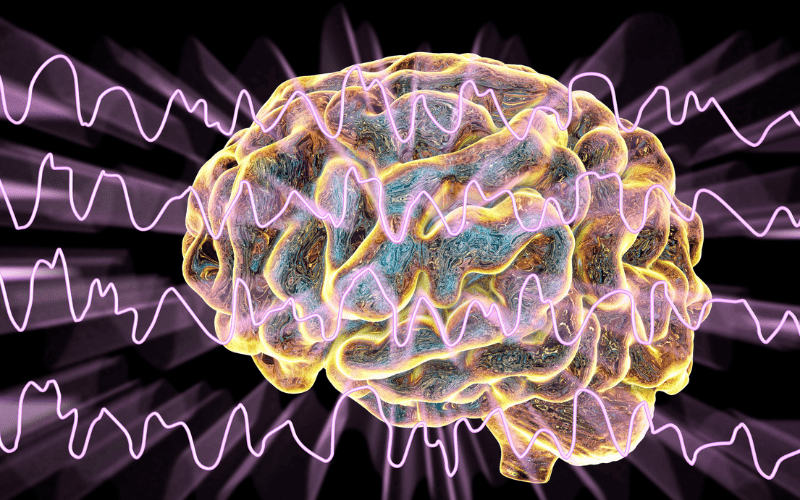
How Hearing Works
The brain interprets sound by processing auditory signals through highly specialized structures and pathways. When sound waves first reach the ears, the eardrum (tympanic membrane) and tiny bones in the middle ear (ossicles) vibrate. Then, signals are transmitted to the inner ear to the spiral-shaped organ called the cochlea. Inside the cochlea, specialized hair cells transmit signals to the auditory nerve. From there, the auditory stimulus travels through neural pathways and into the brain’s auditory cortex. The brain then analyzes the frequency, volume, location, and patterns of these signals, which results in us understanding sound. Incredibly, this entire process takes less than 1/100th of a second.
Parts Of The Brain Responsible For Hearing
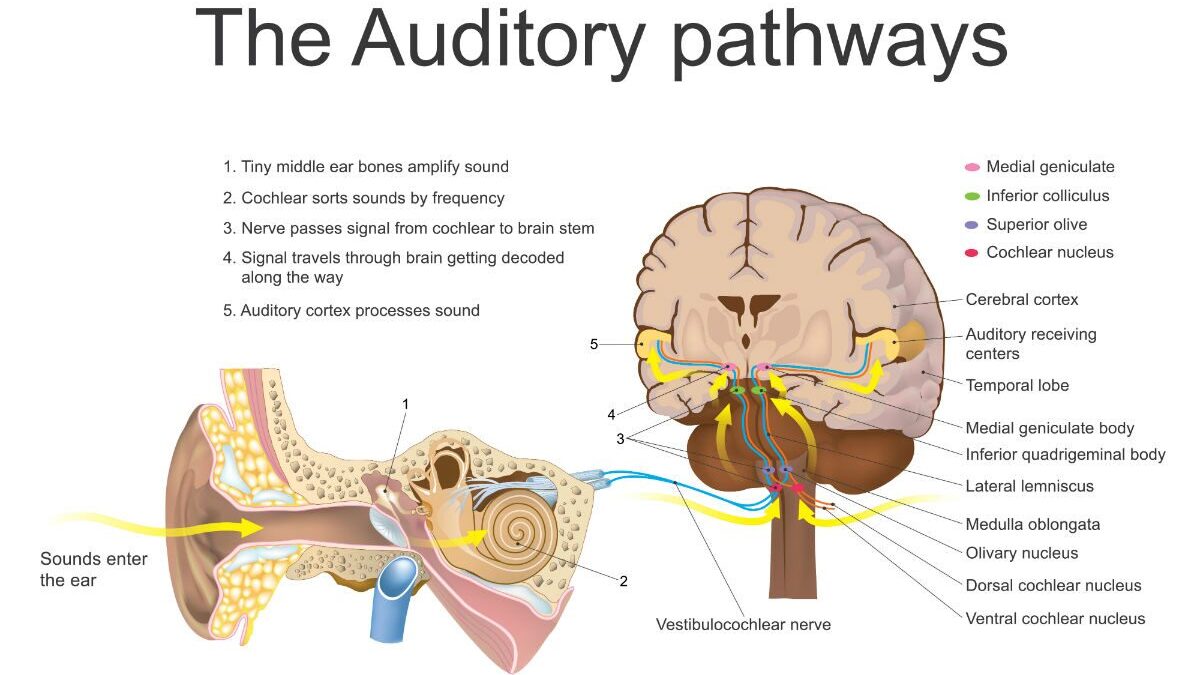


The entire brain participates in sound processing, but most of this work takes place within the brain structures that make up the auditory system. These parts of the brain include:
- Auditory nerve. After the cochlea converts sound waves into electrical signals, the auditory nerve picks up these signals and transmits them to the brainstem.
- Cochlear nuclei. These are the first parts of the brain that begin the sound interpretation process.
- Inferior colliculus. This midbrain structure analyzes sound intensity and processes complex signals
- Medial geniculate nucleus. This part of the thalamus relays input from the inferior colliculus to the auditory cortex.
- Primary auditory cortex. Higher-level processing of auditory information – such as recognizing pitch, tone, frequency, and spatial location – occurs here in this part of the temporal lobe.
- Non-auditory brain areas. After the auditory cortex processes sound, other regions of the brain involving memory and emotion complete the auditory picture.
Research Exploring The Link Between Brain Activity And Tinnitus
The brain’s auditory processing sequence is highly complex and organized – so why do we hear tinnitus if it has no source? If you have hearing loss, your brain is unable to receive and map auditory information properly. In the absence of enough stimulation, your brain attempts to fill in the gaps by generating tinnitus sounds.
Tinnitus is linked to abnormal changes along the auditory pathway, and the auditory system is unable to relay enough information. Human brain imaging studies have identified altered tinnitus-related activities in the auditory areas of specific brain regions – the inferior colliculus and the auditory cortex.
This only scratches the surface of research into the brain’s role in tinnitus perception.
Tinnitus And Underlying Brain Mechanisms
The current understanding of tinnitus and its underlying brain mechanisms is that people who experience chronic tinnitus have changes in their brain structures. In other words, tinnitus has quite literally rewired their perceptions.
Magnetic resonance imaging (MRI) tests showed that, when compared to people without tinnitus, those with chronic tinnitus had different brain responses when presented with sound. These changes took place in the cortical and subcortical auditory nuclei. There were also differences in the thalamus, auditory brainstem, and auditory cortex.
Furthermore, non-auditory areas of the brain, including the limbic system, which contributes to memory, motivation, emotion, and attention. This explains why the perception of bothersome tinnitus can be so distressing that it can lead to anxiety, depression, and worsen other mental health conditions.
A Key Role Of The Prefrontal Cortex In The Maintenance Of Chronic Tinnitus
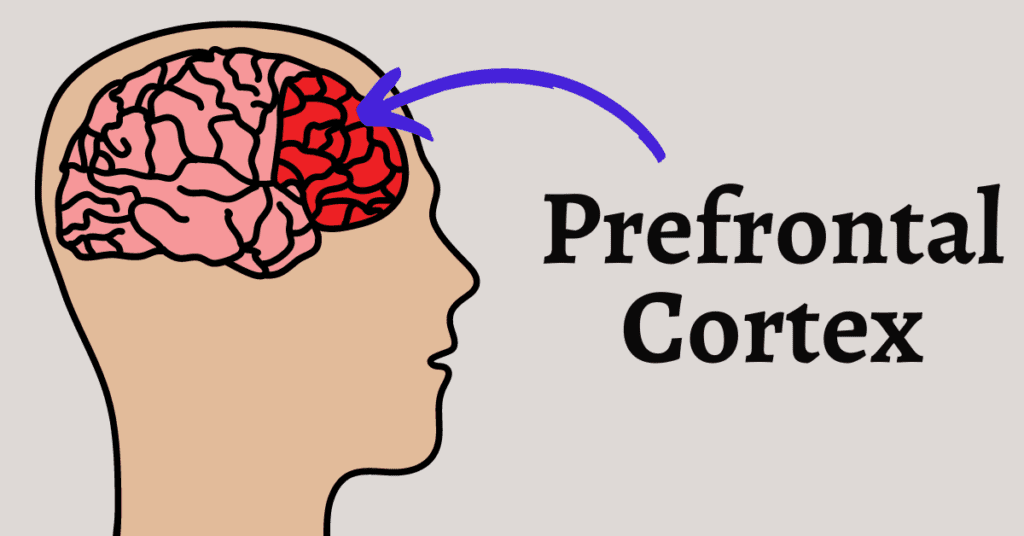


The prefrontal cortex is the self-aware region of the brain that controls our thoughts, emotions, and links to other parts of the brain for planning, problem solving, learning, and decision-making. A recent study focused on the importance of this intelligent part of the brain as it relates to chronic tinnitus.
Sixteen tinnitus patients were studied using functional magnetic resonance imaging (fMRI) while they completed a Stroop task (such as reading the word “blue” written in orange text). Results showed that there was an impairment in executive function and there were brain alterations in the frontal cortex. Tinnitus patients showed different brain activity in their dorsolateral prefrontal cortex, cingulate gyrus, and ventromedial prefrontal cortex – brain regions that are involved in decision-making, attention, memory, and judgment.
Neural Pathways And The Auditory Cortex
The most common physical condition related to tinnitus is damage to the hair cells in the cochlea or damage to the fibers of the auditory nerve, usually caused by acoustic trauma (loud noise exposure) or ototoxic drugs. Without enough sensory input, the central auditory system is over-responsive and compensates for the missing sound stimuli with tinnitus.
A landmark study showed that this hyperactivity typically occurs in regions including the cochlear nucleus, inferior colliculus, and auditory cortex. Functional MRI testing showed that there is a relationship between the intensity of tinnitus symptoms and the amount of changes in the primary auditory cortex.
Another study found that the dorsal cochlear nucleus also contributes to the hyperactivity, over-responsiveness, and spontaneous brain activity that causes tinnitus. This type of response is most pronounced if the tinnitus is caused by loud noise exposure or ototoxic medications.
Tinnitus Causes Changes In Brain Networks
The brain’s role in tinnitus perception isn’t limited to auditory processing – it also plays a major role in the vicious cycle of tinnitus. If a person is unable to distract or un-focus from their tinnitus, they can end up developing strong emotional reactions to the presence of their tinnitus as well.
Limbic And Auditory Networks
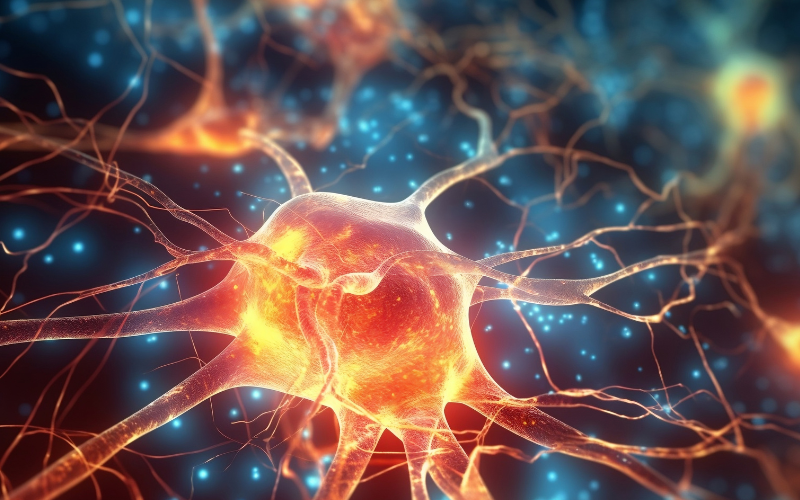


There are many interconnections between the auditory system and auditory conditioning. For example, some sounds (like a hissing snake) can trigger fear while others (like a familiar voice) can trigger feelings of security. Neuroplasticity – that is, the brain’s ability to rewire itself – is central to developing emotional and immediate responses to sounds.
The amygdala is a structure in the limbic system that coordinates emotional expression. Interestingly, this structure is shown to be more active than usual among tinnitus patients. Other limbic system regions including the cingulate cortex, hippocampus, orbitofrontal cortex, and anterior insular cortex are also involved, and these regions are part of a generalized “distress circuit” – meaning that they can be activated by pain, sensations, or sounds – both real and phantom.
Persisting Aversive Memory Networks
Patients with tinnitus are well aware of their phantom sound perception. This self-awareness comes from learning and memory mechanisms, and is part of a larger brain network that’s synchronized with neural activity in the sensory cortex – similar to phantom limb or phantom pain perception.
Knowing this, we can advance our understanding and treatment of tinnitus. Linking tinnitus-related distress with this phantom percept phenomenon can help us understand how memory plays a role in tinnitus.
One key overlap between phantom percepts and tinnitus is the state of hypervigilance. People with bothersome chronic tinnitus are often acutely aware of the ringing in their ears, so they pay close attention to the sound. Not all tinnitus is bothersome, but it is more common among people suffering from post-traumatic stress disorder (PTSD). Exploring the brain’s role in managing aversive emotional memories may help unlock even more effective ways of treating tinnitus.
Dorsal Attention Networks
Studies show that the brain region called the dorsal attention network is involved in the brain changes involved in tinnitus. One study found that not only are there changes within the region, there are alterations in the network that links the dorsal attention network to other areas of the brain. These results indicate that it could be possible to improve tinnitus symptoms by regulating the dorsal attention network.
White Matter And Tinnitus
While most of us have heard the term “gray matter” as it relates to the brain, there are many kinds of matter that make up the brain. White matter is made up of a network of nerve fibers and enables the exchange of information from one region of the brain to another.
A study explored the way white matter changes for tinnitus patients without hearing loss, and found that tinnitus without hearing loss can have a significant physical impact on the structure of white matter, and some of those changes were related to the severity of tinnitus symptoms. This further suggests that there is a closer relationship between tinnitus and the limbic system.
Another study of a similar group of tinnitus patients who did not have hearing loss found that the sensitivity of the white matter fiber bundles were closely related to the limbic structures and the limbic system. More importantly, the study found that these fibers played a role in the onset and development of tinnitus.
The Role Of Sleep In Tinnitus Perception



It should come as no surprise that a good night’s sleep is important to healthy brain function, but the relationship between sleep and tinnitus can be troublesome. The constant ringing in the ears can keep you awake at night, which can in turn worsen tinnitus symptoms. This link has been observed for a long time, but only recently was the role of sleep in tinnitus perception clearly defined.
Like sleep, tinnitus is influenced by spontaneous brain activity. This study explored this similarity and found that brain regions that are impacted by tinnitus are known to have a major role in sleep – specifically slow-wave activity and non-rapid eye movement (NREM) sleep. Tinnitus activity may be reduced during NREM sleep, but as the brain’s activity changes during sleep, tinnitus-related activity could be disrupting, which may cause tinnitus patients to wake up. This might explain why tinnitus patients often have interrupted sleep.
Future Research And Tinnitus Treatment
Today, there is no medication, surgery, or cure for persistent tinnitus. However, researchers are looking for more explanations for tinnitus and working toward developing the most effective treatment possible. Current treatment options can include:
- Tinnitus retraining therapy (TRT)
- Cognitive behavioral therapy (CBT)
- Sound therapy
- Hearing aids
- Treating underlying conditions
Treating tinnitus is a journey. With the help of your audiologist, you can explore your tinnitus treatment options to discover the method that works best for you.
Next Step: Book Free Consultation
- 75% of patients reduced their tinnitus within three months after following our recommendations.
- "I feel like Treble Health literally gave me my life back." - Randy S. (verified customer)
- Join thousands of people who have reduced their tinnitus after scheduling a free consultation.






